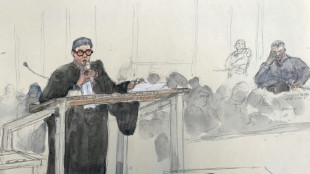
-
 Suarez extends Inter Miami stay with new deal
Suarez extends Inter Miami stay with new deal
-
Perfect Liverpool on top of Champions League, Dortmund also among winners

-
 Liverpool more 'up for it' than beaten Madrid, concedes Bellingham
Liverpool more 'up for it' than beaten Madrid, concedes Bellingham
-
Aston Villa denied late winner against Juventus

-
 Mexico president hails 'excellent' Trump talks after US tariff threat
Mexico president hails 'excellent' Trump talks after US tariff threat
-
Leicester set to appoint Van Nistelrooy - reports

-
 Coffee price heats up on tight Brazil crop fears
Coffee price heats up on tight Brazil crop fears
-
Maeda salvages Celtic draw against Club Brugge

-
 Villa denied late winner against Juventus
Villa denied late winner against Juventus
-
Dortmund beat Zagreb to climb into Champions League top four

-
 Mbappe misses penalty as Liverpool exact revenge on Real Madrid
Mbappe misses penalty as Liverpool exact revenge on Real Madrid
-
Brazil's top court takes on regulation of social media

-
 Thousands still queuing to vote after Namibia polls close
Thousands still queuing to vote after Namibia polls close
-
Trump taps retired general for key Ukraine conflict role

-
 Canadian fund drops bid for Spanish pharma firm Grifols
Canadian fund drops bid for Spanish pharma firm Grifols
-
Argentine ex-president Fernandez gives statement in corruption case

-
 Mexico says Trump tariffs would cost 400,000 US jobs
Mexico says Trump tariffs would cost 400,000 US jobs
-
Car-centric Saudi to open first part of Riyadh Metro

-
 Brussels, not Paris, will decide EU-Mercosur trade deal: Lula
Brussels, not Paris, will decide EU-Mercosur trade deal: Lula
-
Faeces, vomit offer clues to how dinosaurs rose to rule Earth

-
 Ruby slippers from 'The Wizard of Oz' up for auction
Ruby slippers from 'The Wizard of Oz' up for auction
-
Spain factory explosion kills three, injures seven

-
 US Fed's favored inflation gauge ticks up in October
US Fed's favored inflation gauge ticks up in October
-
Defence lawyers plead to judges in French mass rape trial

-
 US says China releases three 'wrongfully detained' Americans
US says China releases three 'wrongfully detained' Americans
-
New clashes in Mozambique as two reported killed

-
 Romania officials to meet over 'cyber risks' to elections
Romania officials to meet over 'cyber risks' to elections
-
Chelsea visit next stop in Heidenheim's 'unthinkable' rise

-
 Former England prop Marler announces retirement from rugby
Former England prop Marler announces retirement from rugby
-
Kumara gives Sri Lanka edge on rain-hit day against South Africa

-
 Namibia votes with ruling party facing toughest race yet
Namibia votes with ruling party facing toughest race yet
-
Spurs goalkeeper Vicario out for 'months' with broken ankle

-
 Moscow expels German journalists, Berlin denies closing Russia TV bureau
Moscow expels German journalists, Berlin denies closing Russia TV bureau
-
Spain govt defends flood response and offers new aid

-
 France says Netanyahu has 'immunity' from ICC warrants
France says Netanyahu has 'immunity' from ICC warrants
-
Nigerian state visit signals shift in France's Africa strategy

-
 Stock markets waver as traders weigh Trump tariffs, inflation
Stock markets waver as traders weigh Trump tariffs, inflation
-
Tens of thousands in Lebanon head home as Israel-Hezbollah truce takes hold

-
 Opposition candidates killed in Tanzania local election
Opposition candidates killed in Tanzania local election
-
Amorim eyes victory in first Man Utd home game to kickstart new era

-
 Fresh fury as Mozambique police mow down protester
Fresh fury as Mozambique police mow down protester
-
Defeat at Liverpool could end Man City title hopes, says Gundogan

-
 Indonesians vote in regional election seen as test for Prabowo
Indonesians vote in regional election seen as test for Prabowo
-
Guardiola says no intent to 'make light' of self harm in post-match comments

-
 New EU commission gets green light to launch defence, economy push
New EU commission gets green light to launch defence, economy push
-
Opposition figures killed as Tanzania holds local election

-
 Taiwan Olympic boxing champion quits event after gender questions
Taiwan Olympic boxing champion quits event after gender questions
-
European stocks drop on Trump trade war worries

-
 Volkswagen to sell operations in China's Xinjiang
Volkswagen to sell operations in China's Xinjiang
-
FA probes referee David Coote over betting claim


Win the vote but still lose? Behold America's Electoral College
When political outsider Donald Trump defied polls and expectations to defeat Hillary Clinton in the 2016 US presidential election, he described the victory as "beautiful."
Not everyone saw it that way -- considering that Democrat Clinton had received nearly three million more votes nationally than her Republican rival. Non-Americans were particularly perplexed that the second-highest vote-getter would be the one crowned president.
But Trump had done what the US system requires: win enough individual states, sometimes by very narrow margins, to surpass the 270 Electoral College votes necessary to win the White House.
Now, on the eve of the 2024 election showdown between Trump and Democrat Kamala Harris, the rules of this enigmatic and, to some, outmoded, system is coming back into focus.
- Why an Electoral College? -
The 538 members of the US Electoral College gather in their state's respective capitals after the quadrennial presidential election to designate the winner.
A presidential candidate must obtain an absolute majority of the "electors" -- or 270 of the 538 -- to win.
The system originated with the US Constitution in 1787, establishing the rules for indirect, single-round presidential elections.
The country's Founding Fathers saw the system as a compromise between direct presidential elections with universal suffrage, and an election by members of Congress -- an approach rejected as insufficiently democratic.
Because many states predictably lean Republican or Democratic, presidential candidates focus heavily on the handful of "swing" states on which the election will likely turn -- nearly ignoring some large states such as left-leaning California and right-leaning Texas.
Over the years, hundreds of amendments have been proposed to Congress in efforts to modify or abolish the Electoral College. None has succeeded.
Trump's 2016 victory rekindled debate. And if the 2024 race is the nail-biter that most polls predict, the Electoral College will surely return to the spotlight.
- Who are the 538 electors? -
Most are local elected officials or party leaders, but their names do not appear on ballots.
Each state has as many electors as it has members in the US House of Representatives (a number dependent on the state's population), plus the Senate (two in every state, regardless of size).
California, for example, has 54 electors; Texas has 40; and sparsely populated Alaska, Delaware, Vermont and Wyoming have only three each.
The US capital city, Washington, also gets three electors, despite having no voting members in Congress.
The Constitution leaves it to states to decide how their electors' votes should be cast. In every state but two (Nebraska and Maine, which award some electors by congressional district), the candidate winning the most votes theoretically is allotted all that state's electors.
- Controversial institution -
In November 2016, Trump won 306 electoral votes, well more than the 270 needed.
The extraordinary situation of losing the popular vote but winning the White House was not unprecedented.
Five presidents have risen to the office this way, the first being John Quincy Adams in 1824.
More recently, the 2000 election resulted in an epic Florida entanglement between Republican George W. Bush and Democrat Al Gore.
Gore won nearly 500,000 more votes nationwide, but when Florida -- ultimately following a US Supreme Court intervention -- was awarded to Bush, it pushed his Electoral College total to 271 and a hair's-breadth victory.
- True vote or simple formality? -
Nothing in the Constitution obliges electors to vote one way or another.
If some states required them to respect the popular vote and they failed to do so, they were subjected to a simple fine. But in July 2020, the Supreme Court ruled that states could impose punishments on such "faithless electors."
To date, faithless electors have never determined a US election outcome.
- Electoral College schedule -
Electors will gather in their state capitals on December 17 and cast votes for president and vice president. US law states they "meet and cast their vote on the first Tuesday after the second Wednesday in December."
On January 6, 2025, Congress will convene to certify the winner -- a nervously watched event this cycle, four years after a mob of Trump supporters attacked the US Capitol attempting to block certification.
But there is a difference. Last time, it was Republican vice president Mike Pence who, as president of the Senate, was responsible for overseeing the certification. Defying heavy pressure from Trump and the mob, he certified Biden's victory.
This time, the president of the Senate -- overseeing what normally would be the pro forma certification -- will be none other than today's vice president: Kamala Harris.
On January 20, the new president is to be sworn in.
C.Meier--BTB
